France
Factsheet
| ETHNIC MINORITIES: | |
|
North African: Indochinese: Basque: Roma: |
n.a. n.a. n.a. 0.62% |
| RELIGIONS: | |
|
Roman Catholic: Muslim: Protestant: Jewish: |
83-88% 7.5% 2% 1% |
| NET MIGRATION: | 500,000 |
| POP. GROWTH RATE: | +0.5% |
| GDP GROWTH: | +0.6% |
| GDP PER CAPITA: | 39.772 |
| UNEMPLOYMENT: | 10.8% |
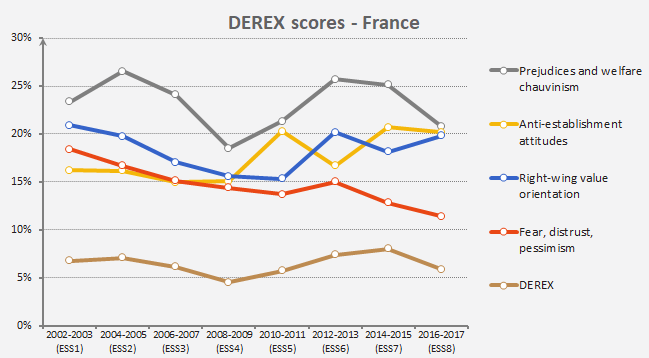
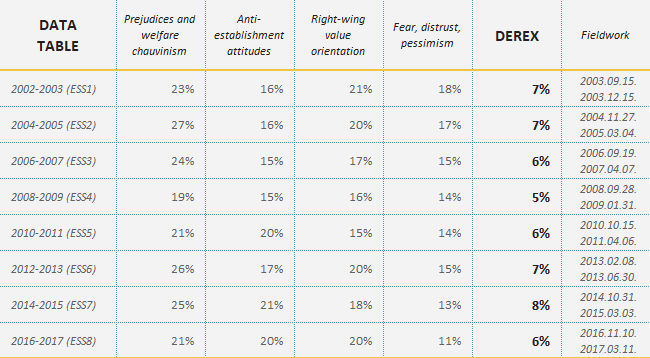
Front National (Front National, FN)
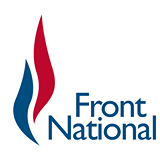
The Front National (FN) was founded in 1972 by Jean-Marie Le Pen. Le Pen was a divisive figure, infamous for his dismissive comments about the Holocaust and holding numerous beliefs on racism and anti-Semitism. His support came from a mixed group of conservative Catholics, supporters of the Vichy regime and protest voters. Le Pen achieved electoral success in 2002 when he beat the then Socialist prime minister to enter the second round of the French presidential elections. But his support collapsed after 2002, and he came in fourth in the 2007 presidential elections, receiving only 10.4 per cent of the vote. In 2010 the FN made a surprise comeback in the regional elections and gained further support when Le Pen stepped down and his daughter, Marine Le Pen, was elected as the new leader of the party earlier this year. She has embarked on a process of “de-demonizing” the party, styling herself as a defender of the republic and the welfare state and strenuously denying anti-Semitism. Marine Le Pen has refocused the party on the issues of immigration and Islam. She describes her position on immigration in France as ‘nothing to do with racism, it’s an economic problem’. She protests the ‘Islamification’ of France and says she wants to defend republican values, feminism and secularism from Muslim extremists. She argues that everyone in France should be made to adhere to French laws and principles, and claims that, while Islam is compatible with Western values, Sharia law is not. She also opposes free-market capitalism and globalization, and wants France to pull out of the euro zone.
The close to 12% received in the 2010 regional elections has significantly improved the FN's support. The party appears to remain highly popular; in the 2012 presidential election Marine Le Pen received 17.9% of the votes and finished third, and in the general elections held in the same year it had 13.6% in the first round. The Eurosceptic party is an odds on favorite; based on February 2014 surveys, with a 20% of popular support it has all but caught up with leading UMP with 22%. The party’s program is defined fundamentally by its opposition to the European Union. Marine Le Pen has demanded that France abandon the euro, and she continues to support the restoration of national borders. Her position on migration and especially her anti-Muslim stance are diametrically opposed to the EU's immigration policy.
The party prepared for the EP campaign under the auspices of the European Alliance for Freedom, created jointly with Vlaams Belang and Dutch PVV. A manifesto issued at its first press conference on December 11, 2013, the EAF identified the creation of regional, monetary, legislative and national sovereignty as the cornerstones of a future Europe. While they were not successful at creating a formal group within the EP in 2014, Marine Le Pen and Geert Wilders announced a new formation in June 2015, called “Europe of Nations and Freedoms”, formed of seven different far-rights Eurosceptic parties from Austria, Italy, the Netherlands, Poland, England and Belgium and France. This group is presided by Marine Le Pen.
Early 2015, Jean-Marie Le Pen was demoted from his role as president of the party, thus creating tense relations within the party and more specifically between himself and his daughter.
In December 2015, after the Paris terror attacks, the regional elections took place in France. Front National won in six regions out of 13 in the first round and received 29.5 % of the votes. After the second round however the party failed to win in any of the regions, even Marie Le Pen’s home region voted in favor of center-right candidate instead of Le Pen. Les Republicans received the majority of votes in seven regions and socialists won in five regions. Although Front National’s share of votes remained above 27% which indicates significant voter base.
Source:
- Jamie Bartlett et al.: “The New Face of Digital Populism.” Demos: London 2011, p. 101. Available online at http://www.demos.co.uk/files/Demos_OSIPOP_Book-web_03.pdf?1320601634
- Political Capital

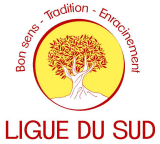
The "Ligue du Sud" is a French political party, which was created during the regional elections in 2010 by Jacques Bompard. Today, Jacques Bompard is the mayor of the town of Orange, in the South East of France. He left the Front National in 2005 despite having been one of the founding members in 1972 and a party member for 33 years. Jacques Bompard created the Ligue du Sud in reference to the extremist right wing Ligue du Nord party in Italy. Today, the Ligue du Sud is a major rival party to the FN especially in the region of Vaucluse.
In 2013, the Ligue du Sud included parties such as the Bloc identitaire, the Parti de la France, the Mouvement national républicain, all of which used to be affiliated with the Front National. The politics of the Ligue du Sud are considered far-right. They include: the ban of foreign flags near town halls, refusing same-sex marriage, removing social centres in high-immigrant areas, introducing anti-Semitic books and books supporting the SS in local libraries.
Source:
- Political Capital

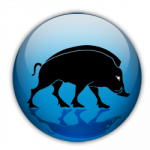
Our thematic websites
Political Capital's analyses and activities in English.
Research and advocacy programme focused on the role conspiracy theorising plays in shaping populist and radical politics.
Our project New electoral system in Hungary: watchdogging, advocacy and raising awareness focuses on the electoral reform in Hungary.
Our blog on political and societal extremism and conspiracy theories.
DEREX website is supported by















